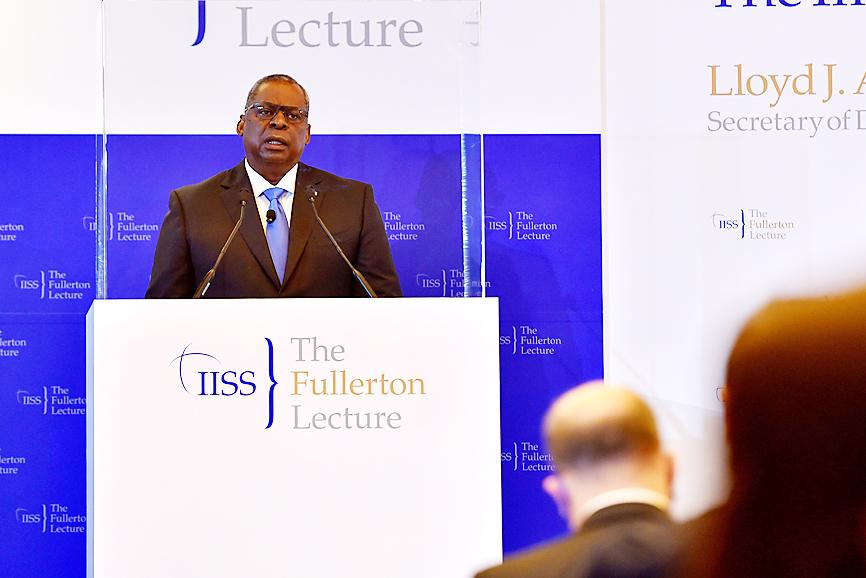The Ministry of Foreign Affairs has expressed its gratitude for comments by US Secretary of Defense Lloyd Austin in a speech in Singapore on Tuesday that reiterated Washington’s commitment to Taiwan’s security.
Austin delivered the speech, titled “The imperative of partnership,” at the 40th Fullerton Lecture, which was hosted by the UK International Institute for Strategic Studies.
“I’ve come to Southeast Asia to deepen America’s bonds with the allies and partners on whom our common security depends... And I never take an ally for granted,” Austin said.

Photo: Reuters
The most urgent task is to recover from the COVID-19 pandemic, he said, adding that a global recovery requires global vaccination.
The Indo-Pacific region was made a top priority in US President Joe Biden’s plan to deliver more than 500 million COVID-19 vaccine doses worldwide, he said, adding that over the past two months, the US has donated about 40 million doses in the region, including to Taiwan, Indonesia, Laos, Malaysia, the Philippines, South Korea, Thailand and Vietnam, he said.
With new threats and technologies changing the face and pace of warfare, the US, along with its allies and partners, is operating under a new vision called “integrated deterrence,” which included the so-called “gray zone,” where the rights and livelihoods of Southeast Asians are coming under stress, he said.
“Meanwhile, we are working with Taiwan to enhance its own capabilities and to increase its readiness to deter threats and coercion, upholding our commitments under the [US’] Taiwan Relations Act, and consistent with our one China policy,” he added.
Beijing’s claim to the vast majority of the South China Sea has no basis in international law, Austin said.
“We have also seen [Beijing’s] aggression against India, destabilizing military activity and other forms of coercion against the people of Taiwan, and genocide and crimes against humanity against Uighur Muslims in Xinjiang,” he said.
“We will not flinch when our interests are threatened. Yet we do not seek confrontation,” Austin said.
“As secretary, I am committed to pursuing a constructive, stable relationship with China, including stronger crisis communications with the [Chinese] People’s Liberation Army,” he said. “You know, big powers need to model transparency and communication — and we hope that we can work together with Beijing on common challenges, especially the threat of climate change.”
In Taipei, Ministry of Foreign Affairs spokeswoman Joanne Ou (歐江安) thanked Austin for reiterating Washington’s commitment to Taiwan’s security, as well as thanking the Biden administration for donating 2.5 million doses of the Moderna vaccine to Taiwan.
The Biden administration has repeatedly said that its commitment to Taiwan is “rock solid” under the Taiwan Relations Act and the “six assurances,” while engaging with its allies to underscore the importance of peace and stability across the Taiwan Strait, Ou said.
As a close partner of the US in the Indo-Pacific region, the nation would continue to boost its defense capabilities, and contribute to peace and stability across the Strait and the region, she said.

PREPAREDNESS: Given the difficulty of importing ammunition during wartime, the Ministry of National Defense said it would prioritize ‘coproduction’ partnerships A newly formed unit of the Marine Corps tasked with land-based security operations has recently replaced its aging, domestically produced rifles with more advanced, US-made M4A1 rifles, a source said yesterday. The unnamed source familiar with the matter said the First Security Battalion of the Marine Corps’ Air Defense and Base Guard Group has replaced its older T65K2 rifles, which have been in service since the late 1980s, with the newly received M4A1s. The source did not say exactly when the upgrade took place or how many M4A1s were issued to the battalion. The confirmation came after Chinese-language media reported

The Taiwanese passport ranked 33rd in a global listing of passports by convenience this month, rising three places from last month’s ranking, but matching its position in January last year. The Henley Passport Index, an international ranking of passports by the number of designations its holder can travel to without a visa, showed that the Taiwan passport enables holders to travel to 139 countries and territories without a visa. Singapore’s passport was ranked the most powerful with visa-free access to 192 destinations out of 227, according to the index published on Tuesday by UK-based migration investment consultancy firm Henley and Partners. Japan’s and

A Ministry of Foreign Affairs official yesterday said that a delegation that visited China for an APEC meeting did not receive any kind of treatment that downgraded Taiwan’s sovereignty. Department of International Organizations Director-General Jonathan Sun (孫儉元) said that he and a group of ministry officials visited Shenzhen, China, to attend the APEC Informal Senior Officials’ Meeting last month. The trip went “smoothly and safely” for all Taiwanese delegates, as the Chinese side arranged the trip in accordance with long-standing practices, Sun said at the ministry’s weekly briefing. The Taiwanese group did not encounter any political suppression, he said. Sun made the remarks when

BROAD AGREEMENT: The two are nearing a trade deal to reduce Taiwan’s tariff to 15% and a commitment for TSMC to build five more fabs, a ‘New York Times’ report said Taiwan and the US have reached a broad consensus on a trade deal, the Executive Yuan’s Office of Trade Negotiations said yesterday, after a report said that Washington is set to reduce Taiwan’s tariff rate to 15 percent. The New York Times on Monday reported that the two nations are nearing a trade deal to reduce Taiwan’s tariff rate to 15 percent and commit Taiwan Semiconductor Manufacturing Co (TSMC, 台積電) to building at least five more facilities in the US. “The agreement, which has been under negotiation for months, is being legally scrubbed and could be announced this month,” the paper said,